八年级英语上Unit1教学设计1
- 格式:doc
- 大小:73.50 KB
- 文档页数:6


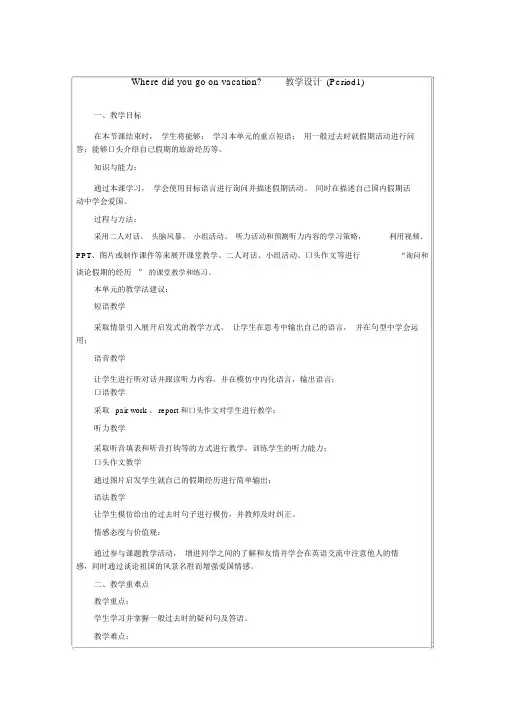
Where did you go on vacation?教学设计(Period1)一、教学目标在本节课结束时,学生将能够:学习本单元的重点短语;用一般过去时就假期活动进行问答;能够口头介绍自己假期的旅游经历等。
知识与能力:通过本课学习,学会使用目标语言进行询问并描述假期活动。
同时在描述自己国内假期活动中学会爱国。
过程与方法:采用二人对话、头脑风暴、小组活动、听力活动和预测听力内容的学习策略,PPT、图片或制作课件等来展开课堂教学、二人对话、小组活动、口头作文等进行谈论假期的经历” 的课堂教学和练习。
利用视频、“询问和本单元的教学法建议:短语教学采取情景引入展开启发式的教学方式,让学生在思考中输出自己的语言,并在句型中学会运用;语音教学让学生进行听对话并跟读听力内容,并在模仿中内化语言,输出语言;口语教学采取pair work 、 report 和口头作文对学生进行教学;听力教学采取听音填表和听音打钩等的方式进行教学,训练学生的听力能力;口头作文教学通过图片启发学生就自己的假期经历进行简单输出;语法教学让学生模仿给出的过去时句子进行模仿,并教师及时纠正。
情感态度与价值观:通过参与课题教学活动,增进同学之间的了解和友情并学会在英语交流中注意他人的情感,同时通过谈论祖国的风景名胜而增强爱国情感。
二、教学重难点教学重点:学生学习并掌握一般过去时的疑问句及答语。
教学难点:帮助学生建立使用助动词did 提问的意识及对谓语动词原形的使用。
三、教学策略语音教学让学生跟读听力材料进行模仿式操练;短语教学采取视频引入话题然后进行启发式教学,并在对话中运用;口语教学采取 pair work 问答式的口语交际活动或小组活动互相操练;听力教学采取听音填表和听音打钩等方式;口头作文教学以对话活动,小组汇报,口头作文等进行口头作文练习;语法教学通过模仿听力材料进行对话练习,在教师的纠正中培养正确的一般过去时语法意识。
四、教学过程Step 1: Lead in通过播放视频引出本节课话题“假期经历”,复习有关假期活动的短语。
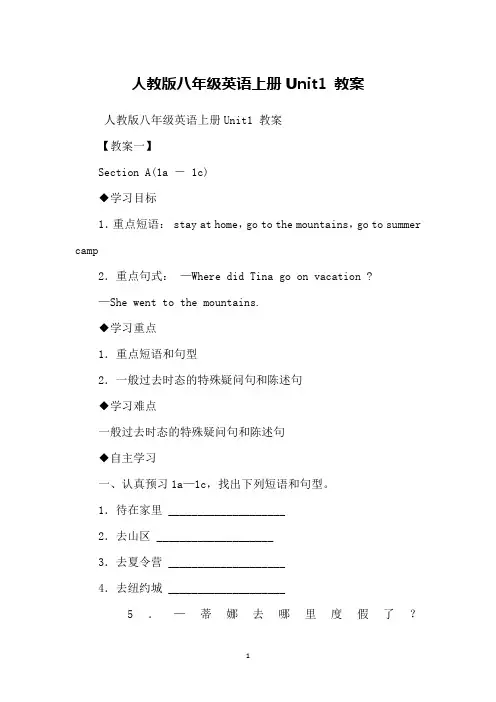
人教版八年级英语上册Unit1 教案人教版八年级英语上册Unit1 教案【教案一】Section A(1a - 1c)◆学习目标1.重点短语: stay at home,go to the mountains,go to summer camp2.重点句式:—Where did Tina go on vacation ?—She went to the mountains.◆学习重点1.重点短语和句型2.一般过去时态的特殊疑问句和陈述句◆学习难点一般过去时态的特殊疑问句和陈述句◆自主学习一、认真预习1a—1c,找出下列短语和句型。
1.待在家里 ____________________2.去山区 ____________________3.去夏令营 ____________________4.去纽约城 ____________________5.—蒂娜去哪里度假了?___________________________________________________________ _____—她去山区了。
___________________________________________________________ _____________◆课堂导学Step 1情景导入Teacher:Hello,everyone.Glad to see you again.Did you have a good time during the vacation? Did you go anywhere interesting with your parents? Did you do anything special there? Can you tell us where you went on vacation ?环节说明:以学生假期旅行为话题开始本节课的教学,引起了学生的学习兴趣和用英语表达的欲望。
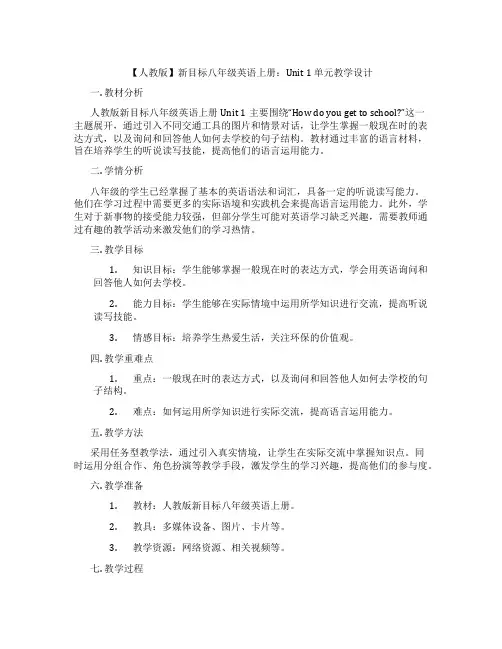
【人教版】新目标八年级英语上册:Unit 1 单元教学设计一. 教材分析人教版新目标八年级英语上册Unit 1主要围绕“How do you get to school?”这一主题展开,通过引入不同交通工具的图片和情景对话,让学生掌握一般现在时的表达方式,以及询问和回答他人如何去学校的句子结构。
教材通过丰富的语言材料,旨在培养学生的听说读写技能,提高他们的语言运用能力。
二. 学情分析八年级的学生已经掌握了基本的英语语法和词汇,具备一定的听说读写能力。
他们在学习过程中需要更多的实际语境和实践机会来提高语言运用能力。
此外,学生对于新事物的接受能力较强,但部分学生可能对英语学习缺乏兴趣,需要教师通过有趣的教学活动来激发他们的学习热情。
三. 教学目标1.知识目标:学生能够掌握一般现在时的表达方式,学会用英语询问和回答他人如何去学校。
2.能力目标:学生能够在实际情境中运用所学知识进行交流,提高听说读写技能。
3.情感目标:培养学生热爱生活,关注环保的价值观。
四. 教学重难点1.重点:一般现在时的表达方式,以及询问和回答他人如何去学校的句子结构。
2.难点:如何运用所学知识进行实际交流,提高语言运用能力。
五. 教学方法采用任务型教学法,通过引入真实情境,让学生在实际交流中掌握知识点。
同时运用分组合作、角色扮演等教学手段,激发学生的学习兴趣,提高他们的参与度。
六. 教学准备1.教材:人教版新目标八年级英语上册。
2.教具:多媒体设备、图片、卡片等。
3.教学资源:网络资源、相关视频等。
七. 教学过程1.导入(5分钟)利用多媒体展示不同交通工具的图片,引导学生谈论自己如何去学校。
教师通过提问学生,激发他们的学习兴趣。
2.呈现(10分钟)教师通过展示教材中的情景对话,让学生听懂并理解对话内容。
随后,引导学生跟读对话,纠正发音。
3.操练(10分钟)将学生分成小组,让他们模拟对话情景,进行角色扮演。
教师巡回指导,纠正错误,并给予鼓励。

八年级英语上册第一单元教案八年级英语上册第一单元教案Unit 1 How often do you exercise?单元分析: The topic of this unit is about how often you do things. Students will beinterested in learning this unit. It is very helpful for them to have a healthy lifestyle.So it can also raise the students’ learning interest.Title Unit 1 How often do you exercise? Teaching periods :6知识目标knowledge Objects1.Key vocabulary.2.Target language:能力方法目标Ability ObjectsTrain students’ listening, speaking, reading and writing skills.情感态度价值观目标Moral ObjectsFrom this unit ,make the students have heatlthy lifestyle,do more exercise.教学重点Teaching Key PointsLearn the key vocabulary and the target language of this unit.How often do/does?教学难点Teaching Difficult PointsHow to use the key vocabulary and the target language by reading and writing.手段和方法Teaching MethodsA computer for multimedia use.课堂教学设计The First Period Date:I. Teaching Key pointsDrills:What do you usually do on weekends?What does she / he usually do on weekends?some special adv.s: always usually often sometimes hardly ever neverII. Teaching Difficult PointsWhat does she usually do on weekends?The answer to this drill should be practiced more.The usage of some special adv.s.III. Teaching MethodsVisual teaching method. Pairwork.Illuminative teaching method.IV. Teaching AidsA tape recorder.A computer for multimedia use.V. Teaching Procedures Section AStep I. Greetings and Revision.Greet the class warmly.Have a free talk with the students about the summer vacation. Some questions like this:How about your summer vacation? Did you have a good time? What did you do during the vacation?Step II. Leading inNow a new term is coming. Are you ready?What do you usually do at school? Do you study hard? Do you sleep in class? Do you talk in class? Does he / she? Revise : Don’t talk in class. Don’tStep III. Section A 1aTalk about weekend activities.What do you usually do on weekends? What does she /he usually do on weekends? Do exercises in 1a.Try to use the words: always usually often sometimes hardly ever neverLook at the picture. Make a list of the different weekend activities.Step IV. Listening Practice 1bListen to the conversation and write the words on the blackboard. Then exlplain them carefully.Step V. PairworkAsk and answer:What do you usually do on weekends? What does she /he usually do on weekends?Step VI. SummaryStep VII. HomeworkAfter class have more practice. Make conversations about the drills we have learnt today.Copy the new words and phrases five timesStep VIII Blackboard DesignUnit 1 How often do you exercise?What do you usually do on weekends?What does she /he usually do on weekends?always usually often sometimes hardly ever never教学反思:The Second Period Date:I. Teaching Key pointsKey vocabulary. Target language. How often do you?II. Teaching Difficult PointsNew target languages: How often do you?III. Teaching MethodsListening and talking method. Pairwork. Illuminative teaching method.IV. Teaching AidsA tape recorder.A computer for multimedia use.V. Teaching Procedures Section A 2a-2cStep I Greetings and Revision.Greet the class as usual and revise.What do you usually do on weekends?What does she usually do on weekends?Step II Section A 2a Leading inDo you like watching TV? Can you watch it every day? How often do you watch TV?Do you often go to the movies?How often do you go to the movies?Do you like playing sports? Play sports we can also say exercise. How often do you exercise?I like shopping very much.I usually shop once a week.Does your mother like shopping?How often does she shop? How about you?every day, once a week, twice a week,three times a week etc.Step III Listening PracticeListen and number the activities you hear.Step IV Listening practice 2bStep V. 2c PairworkTalk about the information in the chart. Make a conversation like this:How often do you ?surf the Internet exerciseStep VI. Grammar focusPlease look at the grammar box.What do you usually do on weekends?What does she usually do on weekends?How often do you ?How often does she?Step VII. HomeworkCopy the new words and phases five times.Make some conversations about the drills we have learnt today.Step VIII Blackboard DesignUnit 1 How often do you exercise?What do you usually do on weekends?What does she usually do on weekends?How often do you ?How often does she?surf the Internet exercise教学反思:The Third Period Date:I. Teaching Key pointsKey vocabulary and target language.II. Teaching Difficult PointsNew target languages How often do you?III. Teaching MethodsPairwork. Illuminative teaching method.IV. Teaching AidsA tape recorder. A computer for multimedia use.V. Teaching Procedures Section A 3-4Step I .Greetings and RevisionGreet the class as usual.Check the students’ homework.. Have a free talk with the students. Talk about their hobbis.How often do you How often does your mother or father do?Step II .3 Leading inWhat activities do we have in our school? Such as:watch TV Chinese speech contestSinging competition Art Festival school tripHow often do we have them?Besides these activities what should we do every day? Do you wantto know something about other school? The students in another school? Now let’s read an article about the activity survey in Green High School. First read it and try to fill in the blanks.Step III Reading and understandingAsk the students to read the article. Then explain the word: all most some noNew language points: Here are as foronce or twice a weekStep IV.GroupworkTalk about the ways to learn English well. Ask the students to give the best ways they think. Make a conversation like this:How often do you?Step V. HomeworkCopy the new words and phases five times.Make some conversations about the drills we have learnt today.Step VI Blackboard DesignUnit 1 How often do you exercise?How often do you ?How often does she?Here areonce or twice a week教学反思:The Fourth Period Date:I. Teaching Key pointsKey vocabulary and target language.II. Teaching Difficult Pointswant sb. to do be good forIII. Teaching MethodsPairwork. Illuminative teaching method.IV. Teaching AidsA tape recorder. A computer for multimedia use.V. Teaching Procedures Section B 1a-2cStep I .GreetingsGreet the class as usual and check the homework.Step II . New WordsShow the new words on the screen. Read these new words and ask students to repeat. Make sure every student can understand the meanings of the new words. Mach the new words with the pictures.StepIII. Sect ion B 1b pairworkwant sb. to do be good forAsk students to make conversations with each other.Step 1V. 2a Listening practiceListen and circle your answer to each question.Step V .2bT: Now we’ll listen to the conversation again. Please write the short answers to the question.Play the tape and ask students to complete the answers individually. Then correct the answers.(This activity provides listening and writing practice using the target language. )Step VI. 2c PairworkStep VI.Summary and HomeworkCopy the new words and phases five times.Make some conversations about the drills we have learnt today.Step V..Blackboard DesignUnit 1 How often do you exercise?How often do you ?want sb. to do be good for教学反思:The Fifth Period Date:I.Teaching Key points:Key vocabulary. Target language.II. Teaching Difficult PointsThe usage of the target languageIII. Teaching Methods(1) Writing method.(2) Discovering method.(3) Practicing method.IV. Teaching AidsA tape recorder. A computer for multimedia use.V. Teaching ProceduresStep I.GreetingsGreet the class as usual and check the homework.Step II. Lead- inAsk students some questions about their lifestyle.How often do you exercise? How often do you eat vegetables?Do you like junk food? Show the new words on the screen. Read them and ask students to repeat for several times.pretty healthy come home from school eating habbitstry to do of course so you see look after get good grades help sb. to doStep III. 3aLook at the letter. First read it by yourselves.Then answer the five questions about the letter.Teacher shows the five questions on the screen and ask some students to read the letter.Ask some students to answer the questions .Then use the computer to show the answers to the questions.T: Do you have any other questions?Please put up your hands.Explain the questions for the students, make them understand the letter better. Then help the students to tetell the letter.Step IV. 3bFill in the blanks in Bill’s letter.(This activity provides reading and writing practice using the target language.)Step V .3c Writing practiceWrite about your own habits.StepVI Survey ,summary and homeworkStep VII.Blackboard DesignUnit 1 How often do you exercise?pretty healthy come home from school eating habbitstry to do of course so you see look after get good grades help sb. to do教学反思:The Sixth Period Date:I. Teaching Key pointsKey vocabulary and target language.II. Teaching Difficult PointsWriting practiceIII. Teaching MethodsPairwork. Illuminative teaching method.IV. Teaching AidsA tape recorder. A computer for multimedia use.V. Teaching ProceduresStep I .Greetings and RevisionGreet the class as usual and check the homework.Step II. RevisionShow some words of this unit on the screen. Make sure every students knows the meanings of the words. Then try to retell the letter.StepIII .Self Check 1Fill in the blanks.(This activity provides a comprehensive review of all key vocabulary presented in this unit.)Step IV. Self Check 2Writing practice. Write about a famous person. Imagine his or her lifestyle.StepVIII. SummaryIn this class we’ve reviewed key vocabulary in this unit and learnt to write a short passage.Step IX.HomeworkThe Exercises of the workbook. Recite the new words.Step X .Blackboard DesignUnit 1 How often do you exercise? want sb. to do keep in good health try to do eat less meathave a healthy lifestyle教学反思:。
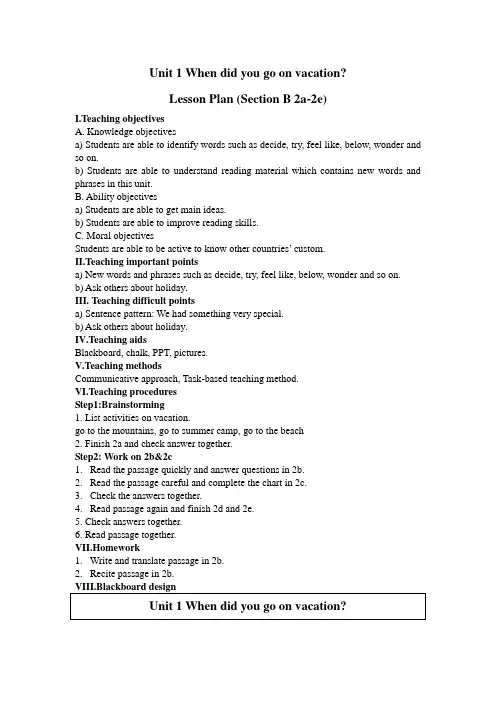
Unit 1 When did you go on vacation?Lesson Plan (Section B 2a-2e)I.Teaching objectivesA. Knowledge objectivesa) Students are able to identify words such as decide, try, feel like, below, wonder and so on.b) Students are able to understand reading material which contains new words and phrases in this unit.B. Ability objectivesa) Students are able to get main ideas.b) Students are able to improve reading skills.C. Moral objectivesStudents are able to be active to know other countries’ custom.II.Teaching important pointsa) New words and phrases such as decide, try, feel like, below, wonder and so on.b) Ask others about holiday.III. Teaching difficult pointsa) Sentence pattern: We had something very special.b) Ask others about holiday.IV.Teaching aidsBlackboard, chalk, PPT, pictures.V.Teaching methodsCommunicative approach, Task-based teaching method.VI.Teaching proceduresStep1:Brainstorming1. List activities on vacation.go to the mountains, go to summer camp, go to the beach2. Finish 2a and check answer together.Step2: Work on 2b&2c1.Read the passage quickly and answer questions in 2b.2.Read the passage careful and complete the chart in 2c.3.Check the answers together.4.Read passage again and finish 2d and 2e.5. Check answers together.6. Read passage together.VII.Homework1.Write and translate passage in 2b.。
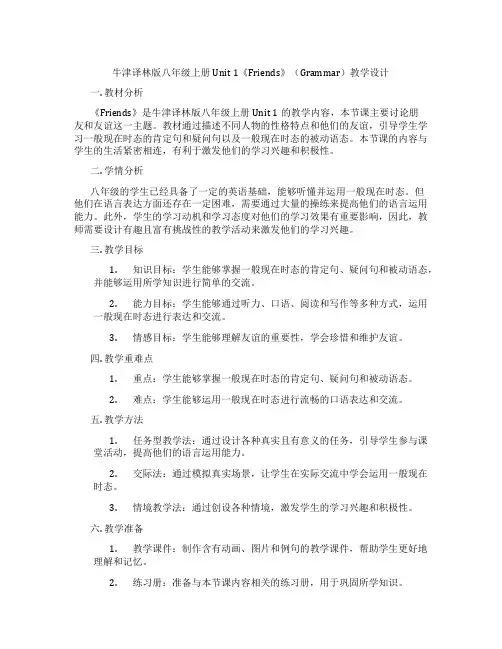
牛津译林版八年级上册Unit 1《Friends》(Grammar)教学设计一. 教材分析《Friends》是牛津译林版八年级上册Unit 1的教学内容,本节课主要讨论朋友和友谊这一主题。
教材通过描述不同人物的性格特点和他们的友谊,引导学生学习一般现在时态的肯定句和疑问句以及一般现在时态的被动语态。
本节课的内容与学生的生活紧密相连,有利于激发他们的学习兴趣和积极性。
二. 学情分析八年级的学生已经具备了一定的英语基础,能够听懂并运用一般现在时态。
但他们在语言表达方面还存在一定困难,需要通过大量的操练来提高他们的语言运用能力。
此外,学生的学习动机和学习态度对他们的学习效果有重要影响,因此,教师需要设计有趣且富有挑战性的教学活动来激发他们的学习兴趣。
三. 教学目标1.知识目标:学生能够掌握一般现在时态的肯定句、疑问句和被动语态,并能够运用所学知识进行简单的交流。
2.能力目标:学生能够通过听力、口语、阅读和写作等多种方式,运用一般现在时态进行表达和交流。
3.情感目标:学生能够理解友谊的重要性,学会珍惜和维护友谊。
四. 教学重难点1.重点:学生能够掌握一般现在时态的肯定句、疑问句和被动语态。
2.难点:学生能够运用一般现在时态进行流畅的口语表达和交流。
五. 教学方法1.任务型教学法:通过设计各种真实且有意义的任务,引导学生参与课堂活动,提高他们的语言运用能力。
2.交际法:通过模拟真实场景,让学生在实际交流中学会运用一般现在时态。
3.情境教学法:通过创设各种情境,激发学生的学习兴趣和积极性。
六. 教学准备1.教学课件:制作含有动画、图片和例句的教学课件,帮助学生更好地理解和记忆。
2.练习册:准备与本节课内容相关的练习册,用于巩固所学知识。
3.听力材料:准备与本节课主题相关的听力材料,帮助学生提高听力技能。
七. 教学过程1.导入(5分钟)通过向学生提问“你的朋友是什么样的人?”等问题,引导学生谈论朋友和友谊,激发他们的学习兴趣。
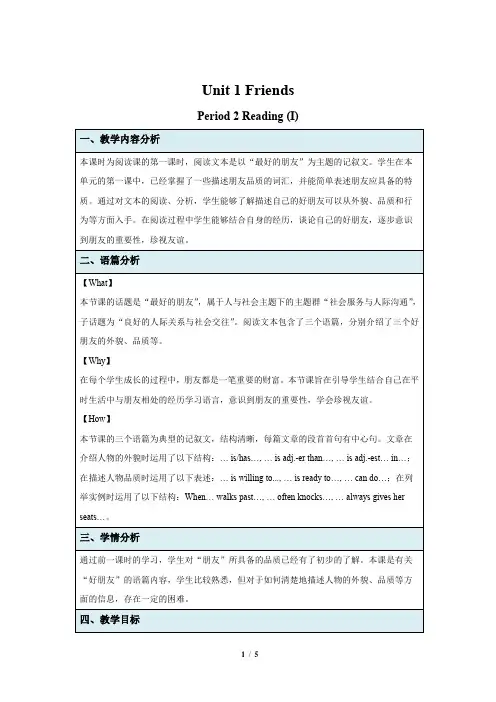
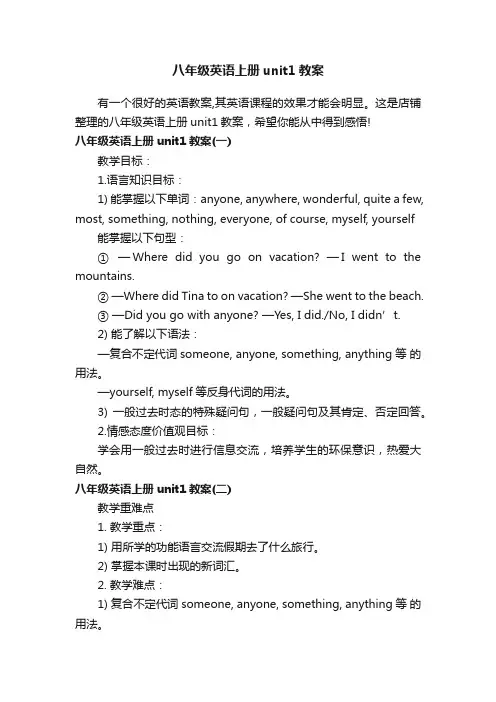
八年级英语上册unit1教案有一个很好的英语教案,其英语课程的效果才能会明显。
这是店铺整理的八年级英语上册unit1教案,希望你能从中得到感悟!八年级英语上册unit1教案(一)教学目标:1.语言知识目标:1) 能掌握以下单词:anyone, anywhere, wonderful, quite a few, most, something, nothing, everyone, of course, myself, yourself 能掌握以下句型:①—Where did you go on vacation? —I went to the mountains.②—Where did Tina to on vacation? —She went to the beach.③—Did you go with anyone? —Yes, I did./No, I didn’t.2) 能了解以下语法:—复合不定代词someone, anyone, something, anything等的用法。
—yourself, myself等反身代词的用法。
3) 一般过去时态的特殊疑问句,一般疑问句及其肯定、否定回答。
2.情感态度价值观目标:学会用一般过去时进行信息交流,培养学生的环保意识,热爱大自然。
八年级英语上册unit1教案(二)教学重难点1. 教学重点:1) 用所学的功能语言交流假期去了什么旅行。
2) 掌握本课时出现的新词汇。
2. 教学难点:1) 复合不定代词someone, anyone, something, anything等的用法。
2) yourself, myself等反身代词的用法。
八年级英语上册unit1教案(三)1. Show some pictures on the big screen. Let Ss read the expressions.2. Focus attention on the picture. Ask: What can you see? Say: Each picture showssomething a person did in the past. Name each activity and ask students to repeat:Stayed at home, Went to mountains, went to New York City 6. Went to the beach,visited my uncle, visited museums, went to summer camp3. Now, please match each phrase with one of the pictures next to the name of theactivity,point to the sample answer.4. Check the answers. Answers: 1. f 2. b 3. g 4. e5. c6. a7. dIII. Listening1. Point to the picture on the screen.Say: Look at the picture A. Where did Tina go on vacation? She went to mountains.Ask: What did the person do in each picture?2. Play the recording the first time.3. Play the recording a second time.Say: There are three conversations. The people talk about what did on vacation. Listen to the recording and write numbers of the names in the right boxes of the picture.4. Check the answers.IV.Pair work1. Point out the sample conversation. Ask two Ss to read the conversation to the class.2. Now work with a partner. Make your own conversationabout the people in the picture.3. Ss work in pairs. As they talk, move around the classroom and give any help they need.4. Let some pairs act out their conversations.V. Listening1. Tell Ss they will hear a conversation about three students’conversations. Listen for the first time and fill in the chart. Then listen again and check Yes, or No.2. Let Ss read the phrases in the chart of 2b.3. Play the recording the first time. Ss listen and fill in the chart.4. Play the recording a second time for the Ss to check “Yes,I did.” or “No, I didn’t. ”5. Check the answers with the Ss.VI. Pair work1. Let two Ss read the conversation between Grace, Kevin and Julie.2. Let Ss work in pairs and try to role-play the conversation.3. Ask some pairs to act out their conversations.VII. Role-play1. First let Ss read the conversation and match the people and places they went.2. Let Ss act out the conversations in pairs.3. Some explanations in 2d.。
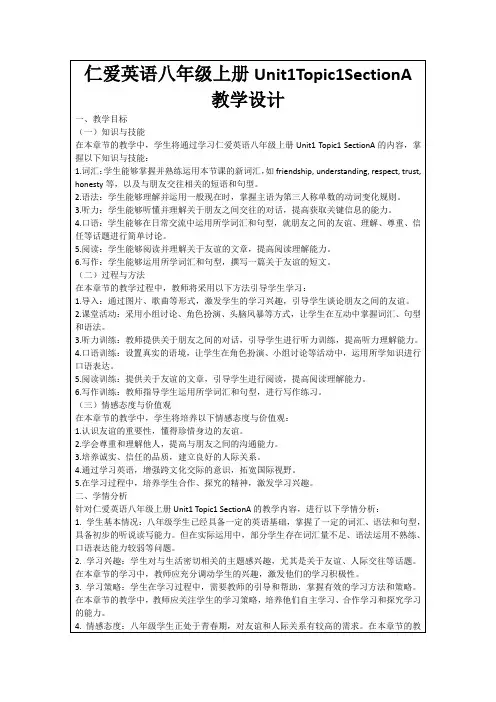
【人教版】新目标八年级英语上册:Unit1单元教学设计一. 教材分析人教版新目标八年级英语上册Unit1 “How do you get to school?” 主要介绍了学生上下学的交通方式以及询问和回答日常交通方式的能力。
本单元关键词有:transportation, way, go to school, by bus, on foot等。
主要句型为:How do you go to school? I go to school by bus.二. 学情分析八年级的学生已经掌握了基本的英语语法和单词,具备一定的听说读写能力。
但对于一些交通方式的专业词汇和表达可能还不够熟悉。
因此,在教学过程中需要引导学生通过情境交际来掌握和运用本节课的词汇和句型。
三. 教学目标1.知识目标:学生能够掌握与交通方式相关的词汇和表达,如transportation, way, go to school, by bus, on foot等;学生能够运用主要句型How do you go to school?进行日常询问和回答。
2.能力目标:学生能够在真实情境中运用本节课所学词汇和句型进行交流。
3.情感目标:培养学生热爱生活,关注环境保护的意识。
四. 教学重难点1.重点:学生能够熟练掌握本节课的词汇和句型,并在实际情境中进行运用。
2.难点:学生能够正确运用主要句型How do you go to school?进行日常询问和回答。
五. 教学方法1.情境教学法:通过设置各种真实情境,让学生在实际交流中掌握和运用本节课的词汇和句型。
2.交际法:引导学生进行生生、师生之间的互动交流,提高学生的口语表达能力。
3.任务型教学法:通过完成各种任务,让学生在实践中运用所学知识。
六. 教学准备1.教学课件:制作包含本节课关键词、句型的课件。
2.教学道具:准备各种交通方式的图片或实物,如自行车、公交车、地铁等。
3.练习题:准备一些练习题,用于巩固所学知识。
Unit 1 Where did you go on vacation?大单元教学设计一、单元主题:本单元的主题是节日与假期,让学生运用一般过去时态在情境中对假期活动进行的口头描述。
引导学生在交际活动中学会如何正确用英语谈论自己和询问他人过去的事情与经历,培养学生的语言运用能力、实践能力、合作能力及创新意识。
二、单元教材分析教学重点:一般过去时态的特殊疑问句,一般疑问句以及肯定和否定回答。
教学要求:1.运用一般过去时态交流假期生活。
2.掌握本单元重点单词和复合不定代词的用法。
词汇和常用表达:能掌握以下单词:Anyone, anywhere, wonderful, few, quite a few, most, someone, something, nothing, everyone, myself, yourself, yourselves, hen, pig, seem, bored, of course, delicious exciting, terrible, expensive, cheap, boring ,activity, decide, try, feel like, bicycle, building, wonder, trader, difference, top, wait, umbrella, wet, because of, below, enough, hungry, as, hill能掌握语法要点:1) -Where did you go on vacation? -I went to the mountains.-Where did Tina go on vacation? -She went to the mountains.-Did you go with anyone? -Yes, I went with my mother.2)复习一般过去时的肯定句,一般疑问句及答语,特殊疑问句及答语;动词过去式的不规则变化。
牛津译林版八年级上册Unit 1《Friends》(Mn task)教学设计一. 教材分析《Friends》是牛津译林版八年级上册Unit 1的一篇课文,主要讲述了朋友之间相互关心、支持和帮助的故事。
本文通过描述两个好朋友Andy和Sarah在日常生活中所遇到的困境,以及他们如何相互鼓励、共同解决问题,从而让学生学会珍惜友谊,懂得在困难面前互相支持的重要性。
二. 学情分析八年级的学生已具备一定的英语基础,能够听懂、读懂简单的英文故事,并能运用所学知识进行简单的交流。
但部分学生对英语学习仍存在恐惧心理,缺乏自信心。
针对这一情况,教师在教学过程中应注重激发学生的学习兴趣,鼓励他们积极参与课堂活动,提高他们的语言运用能力。
三. 教学目标1.知识目标:–能够听懂、读懂《Friends》这篇课文;–能够运用所学的词汇和句型介绍自己的朋友;–能够运用所学知识描述朋友之间的相互关心和支持。
2.能力目标:–能够用英语进行简单的交流,提高口语表达能力;–能够通过阅读课文,提高阅读理解能力。
3.情感目标:–学会珍惜友谊,懂得在困难面前互相支持的重要性;–培养学生的团队协作精神,增强班级凝聚力。
四. 教学重难点•词汇:friend, friendliness, support, encourage, solve problems等;•句型:- How’s your friend? He/She is…•What can I do for you? I can…•理解课文内容,把握人物关系和情感变化;•运用所学知识进行实际操作,如编写故事、角色扮演等。
五. 教学方法1.任务型教学法:通过完成各种任务,让学生在实践中学会运用所学知识;2.情境教学法:创设生活情境,让学生在真实环境中感受、体验英语;3.情感教学法:以情感人,激发学生的学习兴趣,培养他们的情感态度。
六. 教学准备1.教材:牛津译林版八年级上册Unit 1《Friends》;2.多媒体设备:电脑、投影仪、音响等;3.教学课件:根据教学内容设计的课件;4.教学素材:相关图片、视频等。
八年级英语上Unit1教学设计[教学过程]重点词汇appliance efficiently electrical flashfright neater lightening linkmainly microwave operate plugpylon refrigerator steam stormvacuum wirebe known as...be known as作为……而出名He is known as a fair judge.他作为一名公正的法官而出名。
同义词:be famous as辨析:be known for意思是“因……而出名”,相当于be famous for。
He was known for his frankness.他因坦诚而出名。
be known to意思是“……所熟知的”。
As is known to all, the earth is round.正如大家所熟知的那样,地球是圆的。
yet用法在现在完成时的句子中,already常用于肯定句,yet常用于否定句和疑问句,但yet 还有其他用法。
1. 用于否定句中,意思是“还、尚、迄今、到那时”。
例如:He is not yet here. 他还未到。
At three o’clock they had not yet decided whether to play basketball or not.三点钟时他们尚未决定是否去打篮球。
2. 用于疑问句中,意思是“已经”。
例如:Is everything ready yet ? 一切都准备好了吗?3. 与比较级连用,意思是“更”。
例如:Y ou must work yet harder. 你还需更努力地工作。
4. 与once , again , another 连用,意思是“再”。
例如:He has made yet another mistake.他又犯了一个错误。
5. 用于肯定句中,意思是“仍然、还得”。
例如:She is yet a child. 她还是个孩子。
6. 用作并列连词时,意思是“然而、可是”。
例如:He studied hard yet he failed.他学习努力,可是考试仍未及格still:yet 辨析1a. 一般说来,这两个副词几乎可以通用,只是两者在句中的词序稍有不同比较:I’ve still a few more pages to read. 我尚有几页书要读。
I’ve a few more pages to read yet. 我尚有几页书要读。
We have exported a lot of goods,but we must export still more.我们已出口了许多货物,但仍须再多出口一些。
We have exported a lot of goods,but we must export more yet.我们已出口了许多货物,但仍须再多出口一些。
1b. 两者的情态色彩和语气强弱不一样。
试举例来说明。
比较:Is Teddy still here?丹迪仍在这里吗?(仿佛说,他曾在这里,但不知他走了没有,所以这一句等于“Hasn't he left?”的意思。
)Is Teddy here yet?丹迪还没有来吗?(仿佛说,我希望他来,但不知他来了没有,所以这一句等于“Has he arrived?”的意思。
)Is Jane still not here?珍妮还没有到吗?(不愉快的心情较强)Isn’t Jane here yet?珍妮还没有到吗?(不愉快的心情较弱)take与bring都有“带”,“拿”的意思。
take与bring实际上是一对反义动词。
take 的意思是“拿走”,“带走”,指把某人或某物从说话人所在地带往别处。
例如:Take him to hospital at once, please.请马上带他去医院。
bring指“带来”,“拿来”,指把某人或某物从别处带到说话人身边来。
例如:Eddie brings me some books.埃迪给我带来了几本书。
bring to 带来好东西bring on 带来坏东西Work brings happiness to us.Laziness brings misfortunes on us.bring与take在动作方向上的区别相当于come 与go。
请体会这个句子:Take this coat away and bring me mine. 把这件外衣拿走,把我的外衣拿来。
also,too这两个词都是副词,又都表示“也是”的意思,但在修辞意味和使用场合上有所不同。
它们的区别如下:(一)一般说来,also用于比较正式(formal)的场合,语气比too庄重;too是惯熟(familiar)的用语,使用范围较广。
(二)also在句中的位置要紧靠动词;too在句中的位置比较灵活,有时插入句中,前后用逗号分开,有时放在句末。
(三)too只能用在肯定句中,不可用于否定句内。
either只能用于否定句;also即可以用在肯定句中,又可以用在否定句中。
下面请看例句:Reading books is learning,but practice is also learning。
读书是学习,实践也是学习。
We have not heard such a thing. Also,we have never seen such a scene.我们没有听见过这种事情,我们也从来没有见过这种场面。
请注意,一般说来,also在句中的位置应紧靠动词,但有时为了强调其意,也可以将它放在句首或句末。
Mary, too, can play the piano.玛丽也会弹钢琴。
Could you speak Japanese?—Y es,and Spanish too.您会说日语吗?——会的,还会说西班牙语哩。
also虽然和too同义,但前者大都用于书面语,后者大都用于口语。
例:The lady washed the children and also gave them dinner. (书面语)The lady washed the children and gave them dinner too. (口语)在口语中,too还可以用as well代替。
as well as,as well这一对短语仅差一字之微,意义相近,故很易引起混淆。
作为习语用作介词时,as well as的涵义是“还有”、“不但…而且…”。
值得注意的是,在A as well as B的结构里,语意的重点在A,不在B。
因此,“He can speak Spanish as well as English. ”的译文应该是:“他不但会说英语,而且会讲西班牙语”,决不能译作:“他不但会说西班牙语,而且会讲英语”。
如果这样翻译,就是本末倒置了。
as well as和not only… but also…同义,但前者的语意重点和后者的语意重点恰好颠倒。
如果as well as用作连词引出比较从句,其义为“和…一样好”。
因此,“He speaks Spanish as well as English. ”应译作:“他说西班牙语像说英语一样好”。
语意的重点依旧在前部,不在后半部。
make…from make…of make…into make upThey make wine from grapes.This big box is made of wood.They make milk into butter and cheese.A car is made up of many different parts.showshow sb. sth. show sth. to sb.Show me what you have in your bag.He showed me his pictures.1. 一般现在时(the Simple Present Tense)1) 叙述公认的事实和真理,没有时间性,任何时候都是如此。
如:The earth is round.Wealth doesn't always bring happiness to us.2) 叙述现阶段平日习惯或日常的行为活动。
在这种句子里常有表示习惯性的副词、副词短语或从句。
有:often, usually, sometimes, always, never, seldom, every day, once a year, on Sundays等,或从句when…,as soon as…等,如:Do you go to school on Sundays?How often does he go to the cinema?As soon as he arrives, I'll tell him the truth.3) 叙述现在的事实和情况:I think he is an honest man.He wants to be a doctor.4) 在以if, even if, unless, provided that等引出的条件状语从句里。
如:If it rains tomorrow , I’m going to stay at home.I won’t go there unless he invites me .但是,当if, when引导宾语从句时,表示将来时间须用将来时。
如:I don’t know he will come.I wonder if it will rain tomorrow.5) 代替现在时行时:在“Here comes…”、“There goes …”的倒装结构中,用一般现在代替进行时。
如:Look , here comes the teacher!Listen! There goes the bell!【模拟试题】(答题时间:40分钟)一. 选择1. —I forgot to ______ you about today’s homework.—That’s OK. I heard about it from someone else.A. sayB. tellC. talkD. speak2. —Y our present looks nice. Is it ______ silk?—Y es. It’s_______ Hangzhou.A. made for, made byB. made for, made inC. made of, made byD. made of, made in3. —Can I join your club ,Dad?—Y ou can when you______ a bit older.A. getB. will getC. are gettingD. will have got4. —Is David at school today?—No. He is at home _____ he has a bad cold.A. becauseB. ifC. thoughD. until5. —Did you ever go there?—I ______ go there myself.A. useB. used toC. am used toD. was used to6. He was known_____ his honesty.A. asB. forC. toD. on7. Life is made_______ of both sweetness and sorrow.A. fromB. ofC. intoD. up8. Please______ some water to me.A. bringB. takeC. carryD. fetch9. _____ else is coming?A. WhoB. WhatC. WhichD. Where10. When I was still a kid, father told me the earth _______ round the sun.A. turnB. turnedC. turnsD. is turned二. 完型填空Every year students in many countries learn English. Some of these students are children, __1__ students are young people. Why do all these people want to learn__2__? It is not__3__to answer this question. Many boys and girls learn English at school. It is one of their __4__. Many people learn English because it is__5__in their work. Some young people learn English__6__their higher studies because some of their books are__7__English. Other people learn English because they want to __8__newspapers in English. Some people learn English because they want to __9__ in the USA, England or Australia. English is very__10__in our life (生活).1. A. all B. the other C. both D. other2. A. English B. Chinese C. maths D. Japanese3. A. hard B. easy C. good D. nice4. A. books B. classes C. schools D. subjects5. A. good B. useful C. fine D. pleased6. A. for B. of C. to D. from7. A. in B. with C. at D. of8. A. look B. see C. look at D. read9. A. go B. work C. like D. come10. A. help B. helping C. helps D. helpful三. 阅读理解A Golden WatchMr Mike was a young man. He was not very rich. One day he went into a w atch shop to buy a nice-looking watch for his girl friend, Rose. He fixed his eyes on a nice golden watch, and decided to buy it. The shop assistant took the watch out, and asked for three hundred pounds for it. Just then, a boy of about fifteen suddenly rushed over and grasped the watch from the assistant's hand. The assistant hurried out to catch the boy. But it was too late, the boy had disappeared among the street very quickly.On the way home, Mike met the boy, who would sell him the gold watch for only one hundred pounds. “The boy didn't know that I saw him stealing the watch from the shop. And he asked for much less money than that in the shop.” Mike thought to himself. So he paid the boy and took the watch home.The next day, Mike gave the golden watch to Rose, and told her all about the watch.Rose looked at the watch for a while, then, laughed loudly, “Y ou are really a fool!" she said, "This watch isn't worth 100 pounds at all. The assistant and the boy must have planned the whole thing together!”1. The shop assistant said the price of the watch was ____.A. 100 poundsB. 200 poundsC. 300 poundsD. less than 100 pounds2. The shop assistant must have known ____ very well.A. MikeB. the boyC. RoseD. nobody3. The boy would sell Mike the watch for ____.A. 200 poundsB. 300 poundsC. as much money as that in the shopD. much less money than that in the shop4. In fact, the watch was worth ____.A. 100 poundsB. 300 poundsC. just a little moneyD. much more money5. In this story, who really lost something?A. The shop assistantB. MikeC. The boyD. Rose【试题答案】一. 1~5 B D A A B 6~10 C D A A C二. 1~10 D A A D B A A D B D三. 1~5 C B D C B。